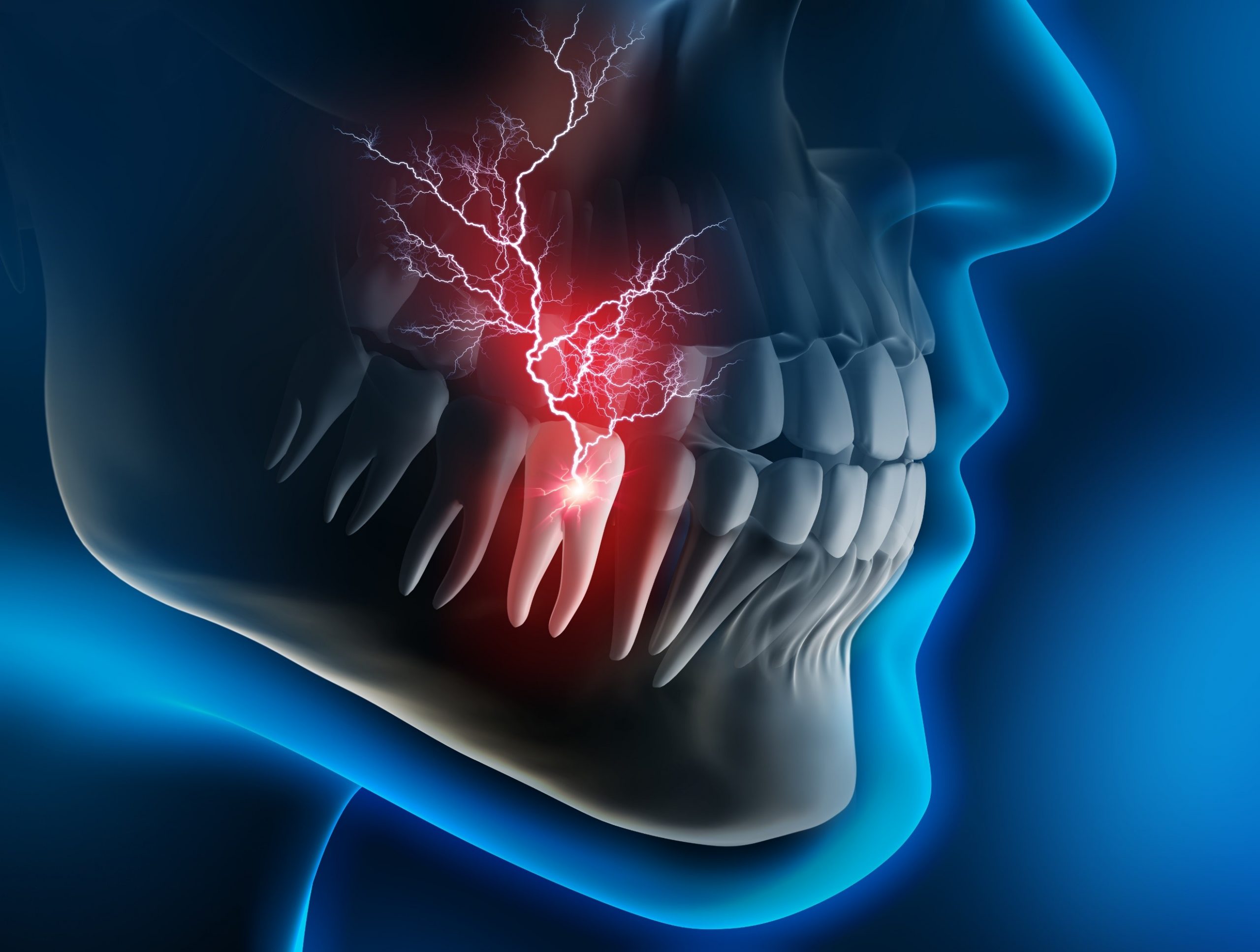Health
Fast and Effective Tooth Pain Relief: Eliminate the Nerve in Just 3 Seconds

Are you tired of the sharp, relentless pain shooting through your tooth? The kind that makes even a sip of water feel like a punishment? Tooth nerve pain can be excruciating, affecting your daily life and causing endless discomfort. But fear not – relief may be closer than you think! Discover how to eliminate that pesky nerve in just 3 seconds permanently. Let’s dive into fast and effective ways to bid adieu to tooth pain for good!
Fast and Effective Tooth Pain Relief: Eliminate the Nerve in Just 3 Seconds
Do you dread that sharp twinge when you bite down or sip something cold? The agony of tooth pain can be all-consuming, affecting your mood, appetite, and overall well-being. Understanding what causes this discomfort is key to finding lasting relief.
Tooth nerve pain can stem from various sources like dental decay, gum disease, fractures, abscesses, or even grinding. These issues can irritate the nerves within your teeth, leading to intense bouts of pain that seem never-ending. But fear not – there are ways to address this discomfort swiftly and effectively.
From natural remedies like clove oil and saltwater rinses to professional procedures like root canals or extractions, there’s a range of options available to help alleviate tooth nerve pain. By targeting the root cause of the issue promptly, you can achieve fast relief and get back to enjoying life without constant dental distress.
The Agony of Tooth Pain
Tooth pain – a sensation that can disrupt your day, making simple tasks like eating or speaking unbearable. It’s like a sharp, persistent reminder that something is not quite right in your mouth. The throbbing ache can range from dull discomfort to intense agony, affecting your overall well-being.
Imagine trying to focus on work or enjoy a meal with this relentless discomfort gnawing at you. The frustration of not being able to find relief easily adds to the distress. Tooth pain doesn’t discriminate – it can strike anyone at any time, causing sleepless nights and irritable days.
The emotional toll of tooth pain shouldn’t be underestimated either. It’s not just physical suffering; it’s mental exhaustion too. Seeking ways to alleviate this torment becomes a top priority for those grappling with the agony of tooth pain.
Understanding Tooth Nerves
Have you ever wondered why tooth pain can be so excruciating? Understanding the intricacies of tooth nerves sheds light on this discomfort.
Tooth nerves are vital components that alert us when something is wrong with our teeth. They send signals to the brain, indicating pain or sensitivity. These nerves are housed within the pulp of the tooth, a soft tissue at its core.
When dental issues arise, such as decay, fractures, or infections, these nerves become irritated and inflamed. This inflammation results in sharp pain that can range from mild to unbearable.
The complex network of nerve fibers within our teeth serves as a warning system for potential problems. Being aware of how these nerves function can help us appreciate the importance of maintaining good oral health practices to prevent unnecessary pain and discomfort in the future.
Dental Decay
Are you experiencing tooth pain that just won’t go away? Dental decay, also known as cavities, is a common culprit behind those sharp twinges of discomfort. It occurs when bacteria in your mouth produce acid that eats away at the enamel of your teeth. This process can lead to small holes in the teeth, causing sensitivity and pain.
Ignoring dental decay can result in more severe issues like infections or abscesses. Regular dental check-ups are essential for catching decay early before it progresses into something more serious. Prevention is key; maintaining good oral hygiene habits such as brushing twice a day and flossing can help prevent dental decay from developing.
If you suspect you have a cavity, don’t delay seeking treatment from your dentist. They can recommend appropriate interventions to halt the progression of decay and alleviate any associated pain. Remember, addressing dental decay promptly is crucial for maintaining optimal oral health and preventing further complications down the road.
Gum Disease
Gum disease, also known as periodontal disease, is a common dental issue that affects the tissues surrounding the teeth. It can range from mild inflammation to severe infection if left untreated. The main cause of gum disease is poor oral hygiene, leading to a buildup of plaque and bacteria along the gumline.
Symptoms of gum disease may include swollen or bleeding gums, bad breath, receding gums, and even tooth loss in advanced stages. Regular brushing, flossing, and dental check-ups are essential in preventing and managing gum disease.
In more severe cases, professional treatment such as deep cleaning (scaling and root planing) or surgery may be necessary to alleviate the condition. Remember that early detection and intervention are key to effectively treating gum disease before it progresses further.
Tooth Fractures
Tooth fractures can be caused by various factors, such as biting down on hard objects or trauma to the mouth. When a tooth is fractured, it can lead to sensitivity, pain when chewing, or even expose the nerve inside the tooth.
Depending on the severity of the fracture, treatment options may vary. Minor fractures can sometimes be treated with dental bonding or a crown to restore the tooth’s structure. However, more severe fractures may require additional procedures like root canal therapy to address any damage to the nerve.
Ignoring a tooth fracture can lead to further complications down the line. It’s important to seek prompt dental care if you suspect that you have a fractured tooth. Your dentist will be able to evaluate the extent of the fracture and recommend an appropriate treatment plan tailored to your specific needs.
Dental Abscess
A dental abscess can cause excruciating pain and discomfort, often characterized by swelling in the affected area. This condition occurs when bacteria infect the tooth’s pulp or gum tissue, leading to a buildup of pus. If left untreated, a dental abscess can result in serious complications that may require immediate medical attention.
Symptoms of a dental abscess include throbbing pain, fever, swollen glands, and an unpleasant taste in the mouth. It is crucial to seek treatment from a dentist promptly to prevent further spread of infection. In some cases, antibiotics may be prescribed to combat the bacterial infection.
To treat a dental abscess effectively, drainage of the pus may be necessary through either root canal therapy or extraction of the affected tooth. Maintaining good oral hygiene practices and attending regular dental check-ups can help prevent dental abscesses from occurring in the future.
Tooth Grinding
Do you ever catch yourself clenching or grinding your teeth, especially during stressful times? This common habit, known as bruxism, can put excessive pressure on your teeth and jaw. Over time, this constant grinding can lead to tooth sensitivity, pain in the jaw muscles, and even worn-down enamel.
Bruxism often occurs unconsciously during sleep but can also happen when you’re awake. Stress and anxiety are major triggers for teeth grinding, so finding ways to relax and unwind may help alleviate this issue. Additionally, wearing a mouthguard at night can protect your teeth from the damaging effects of grinding.
If left untreated, bruxism can result in serious dental problems like fractured teeth or TMJ disorder. Being mindful of this habit and taking steps to address it early on can prevent further damage to your oral health.
Dental Procedures
Are you experiencing severe tooth pain that just won’t go away? Sometimes, dental procedures might be necessary to address the issue effectively. When home remedies and temporary relief methods are not cutting it, it may be time to consider professional intervention.
Dental procedures such as tooth extractions or root canals are commonly performed by dentists to eliminate nerve pain at its source. A tooth extraction involves removing a severely damaged or decayed tooth entirely from its socket, while a root canal aims to clean out infected tissue within the tooth’s pulp chamber.
While these procedures may sound intimidating, they are often the most efficient way to achieve long-term relief from persistent nerve pain. Consulting with your dentist about which procedure is best suited for your specific situation is crucial in finding a lasting solution to your dental discomfort.
Remember, seeking professional help and guidance when dealing with severe tooth pain is essential for maintaining good oral health and overall well-being. Trusting the expertise of dental professionals can lead you on the path towards a healthier smile and a pain-free life.
Possible Causes of Tooth Nerve Pain
Tooth nerve pain can be caused by various dental issues. One common cause is dental decay, which occurs when bacteria erode the tooth enamel, leading to sensitivity and pain. Gum disease is another culprit, where inflammation and infection affect the gums and surrounding tissues, causing discomfort.
Tooth fractures can expose the inner layers of the tooth to bacteria and temperature changes, triggering nerve pain. Dental abscesses are pockets of pus that form due to bacterial infection, putting pressure on the nerves inside the tooth. Tooth grinding or clenching can also lead to nerve pain by wearing down enamel and exposing sensitive areas.
Understanding these possible causes of tooth nerve pain is crucial in finding effective relief strategies. By addressing the root issue behind the pain, individuals can take steps towards achieving long-lasting comfort and oral health.
Ways to Relieve Nerve Pain
When it comes to relieving nerve pain in your tooth, there are a few natural remedies that can provide some relief. One popular option is clove oil, known for its numbing properties and ability to reduce inflammation. Simply apply a small amount directly to the affected area using a cotton ball or swab.
Another simple remedy is a saltwater rinse. Mixing warm water with salt can help reduce swelling and kill bacteria in the mouth, providing temporary relief from tooth nerve pain. Swish the solution around in your mouth for about 30 seconds before spitting it out.
Hydrogen peroxide is also effective in reducing pain and killing harmful bacteria in the mouth. Dilute hydrogen peroxide with water and use it as a mouthwash to help alleviate discomfort caused by tooth nerve sensitivity.
These natural remedies can be beneficial for temporarily relieving tooth nerve pain while you seek professional dental care.
Clove Oil
When it comes to natural remedies for tooth pain, clove oil is a popular choice. This essential oil has been used for centuries due to its analgesic and antibacterial properties. Clove oil contains eugenol, which acts as a numbing agent to provide relief from tooth nerve pain.
To use clove oil for tooth pain relief, dilute a few drops in a carrier oil like coconut or olive oil and apply it directly to the affected area using a cotton ball or swab. Gently massage the oil onto the painful tooth and surrounding gums.
The soothing effects of clove oil can help alleviate discomfort temporarily until you can seek professional dental treatment. It’s important to note that while clove oil can offer temporary relief, it may not address the underlying cause of the tooth pain.
Remember, if you experience severe or prolonged tooth nerve pain, it’s crucial to consult with your dentist for proper diagnosis and treatment options.
Saltwater Rinse
Saltwater rinse is a simple yet effective home remedy for tooth pain. It’s easy to prepare – just mix warm water with salt. The saline solution helps reduce inflammation and kill bacteria in the mouth.
Gargling with saltwater can provide temporary relief from tooth nerve pain by cleansing the area around the affected tooth. The gentle rinsing action can also help dislodge any food particles stuck between teeth, which may be exacerbating the pain.
Saltwater rinse is a natural antiseptic that can promote healing and prevent infection in the mouth. It’s a cost-effective solution that many people find soothing when dealing with dental discomfort.
Remember, while saltwater rinse can offer temporary relief, it’s not a permanent fix for underlying dental issues causing nerve pain. If you experience persistent or severe tooth pain, it’s essential to consult with a dentist for proper diagnosis and treatment options.
Hydrogen Peroxide
Hydrogen peroxide is a common household item that can also be used to help alleviate tooth nerve pain. Its antibacterial properties make it effective in reducing inflammation and killing off harmful bacteria.
To use hydrogen peroxide for tooth pain relief, mix equal parts of 3% hydrogen peroxide with water and swish it around your mouth for about 30 seconds before spitting it out. Be cautious not to swallow the mixture as it can cause irritation if ingested.
Hydrogen peroxide can help reduce swelling and disinfect the affected area, providing temporary relief from tooth nerve pain. However, it is essential to consult with a dentist before using hydrogen peroxide as a long-term solution for dental issues.
Always remember that while hydrogen peroxide can offer some immediate relief, addressing the root cause of the tooth pain is crucial for long-lasting results.
Professional Dental Procedures
Professional dental procedures are often necessary to address severe tooth nerve pain. Two common interventions include tooth extraction and root canal treatment.
Tooth extraction involves removing the entire tooth from its socket. This procedure is typically recommended when the damage to the tooth is irreversible, and saving it is not possible. Although it may sound intimidating, advancements in dentistry have made this process relatively quick and painless.
On the other hand, a root canal involves removing infected or damaged tissue from within the tooth. The goal is to eliminate bacteria while preserving the outer structure of the tooth. Root canals have a reputation for being uncomfortable, but with modern anesthetics, patients can undergo this procedure with minimal discomfort.
Both treatments aim to alleviate nerve pain permanently by addressing the underlying issues causing discomfort. Consulting with a dental professional will help determine which procedure is best suited for your specific situation.
Tooth Extraction
Tooth extraction is a common dental procedure that involves removing a tooth from its socket in the jawbone. This may be necessary for various reasons, such as severe decay, infection, or crowding. Despite advancements in dentistry, sometimes extraction is the best course of action to prevent further complications.
Before the procedure begins, your dentist will numb the area around the tooth to ensure you don’t feel any pain during the extraction process. Once the tooth is removed, gauze is placed over the site to help control bleeding and promote clotting. It’s normal to experience some discomfort after an extraction, but following your dentist’s post-care instructions can help minimize any pain or swelling.
In some cases, you may need additional treatment after a tooth extraction, such as getting a dental implant or bridge to fill in the gap left by the extracted tooth. Your dentist will discuss all your options with you before proceeding with an extraction.
Root Canal
Are you familiar with the term “root canal”? It may sound intimidating, but it’s actually a common dental procedure that can provide relief from severe tooth pain.
A root canal is typically recommended when the nerve of a tooth becomes infected or damaged beyond repair. During this procedure, the dentist removes the affected nerve tissue, cleans and disinfects the inside of the tooth, and seals it to prevent further infection.
Contrary to popular belief, root canals are not as painful as their reputation suggests. With advancements in technology and anesthesia, patients often experience minimal discomfort during the procedure.
By addressing issues within the tooth’s nerve system through a root canal, patients can effectively eliminate ongoing pain and restore oral health without having to resort to extraction.
Remember, if you’re experiencing persistent tooth pain or sensitivity, don’t hesitate to consult with your dentist about whether a root canal may be necessary for your situation.
How to Achieve Instant Relief
Are you looking for immediate relief from that unbearable tooth pain? Here are some quick and effective methods to help you alleviate the discomfort in just a few seconds. One option is using clove oil, known for its natural numbing properties that can provide instant relief when applied directly to the affected area.
Another remedy to consider is a saltwater rinse. Mixing warm water with salt creates a gentle yet powerful solution that can help reduce inflammation and kill bacteria causing the pain. Additionally, hydrogen peroxide can be used as an antiseptic mouth rinse to aid in relieving tooth nerve pain quickly.
Remember, these methods offer temporary relief and it’s crucial to consult with your dentist for long-term solutions. By addressing the root cause of your tooth pain, you can achieve lasting comfort and maintain optimal oral health.
Conclusion
In just 3 seconds, you can eliminate the agony of tooth pain by targeting the nerve causing discomfort. Understanding the root causes of tooth nerve pain is crucial to finding effective relief. Whether it’s dental decay, gum disease, fractures, abscesses, or grinding, identifying the source of your pain is key.
From natural remedies like clove oil and saltwater rinses to professional procedures such as root canals and extractions, there are various ways to address tooth nerve pain. By taking swift action and seeking appropriate treatment, you can achieve fast and lasting relief.
Remember that oral health is an essential part of overall well-being. Don’t let tooth pain disrupt your daily life when solutions are within reach. Take control of your dental health today for a brighter tomorrow!
Health
The Rice Purity Test: A Deep Dive into Its Significance and Impact

The Rice Purity Test: A Deep Dive into Its Significance and Impact :
The Rice Purity Test has become a cultural phenomenon, particularly among college students and young adults. But what exactly is this test, and why has it garnered so much attention.The Rice Purity Test is a self-assessment survey consisting of 100 questions that cover various aspects of personal behavior, ranging from innocent activities to more risqué experiences. Participants mark the activities they have not engaged in, resulting in a “purity score” out of 100, where a higher score indicates a higher level of innocence.
Brief History of the Rice Purity Test :
Originally created by students at Rice University in Houston, Texas, the Rice Purity Test was intended as a fun way to bond with peers and initiate conversations about life experiences. Over the years, it has evolved and spread beyond college campuses, becoming a popular tool for self-reflection and social interaction.
Understanding the Rice Purity Test :
Purpose and Origins
The primary purpose of the Rice Purity Test is to provide a light-hearted way for individuals to reflect on their life experiences and compare them with those of others. While it started as a collegiate tradition, its appeal has broadened due to the rise of social media and the internet.
Who Takes the Rice Purity Test?
While initially popular among college students, the Rice Purity Test is now taken by a diverse range of people. High school students, young adults, and even older individuals participate out of curiosity or for nostalgic reasons.
How to Take the Test
The test is available online on various websites. Participants answer “yes” or “no” to each question, and the total number of “no” responses determines the purity score. The process is straightforward and can be completed anonymously.
Categories of Questions
The Rice Purity Test covers a wide range of topics, divided into several categories:
Social and Personal Conduct
Questions in this category assess general behavior in social settings, such as attending parties, making prank calls, or pulling an all-nighter.
Sexual Behavior
These questions delve into romantic and sexual experiences, from first kisses to more intimate encounters.
Substance Use
Participants are asked about their use of alcohol, tobacco, and drugs, reflecting their experiences with substance consumption.
Academic and Legal Issues
This category includes questions about cheating on tests, getting arrested, or facing other legal troubles.
Relationship Dynamics
Questions here explore the complexities of relationships, including dating, breakups, and unrequited love.
High Scores vs. Low Scores
A high score signifies a more sheltered or cautious lifestyle, while a low score suggests a willingness to explore and take risks. Neither score is inherently good or bad; they simply reflect different life paths.
What Your Score Says About You
Your score can offer insights into your personality and life choices. It might indicate your openness to new experiences, your adherence to societal norms, or your adventurous spirit.
Cultural Impact of the Rice Purity Test
Popularity in Colleges and Universities
The test remains a staple on college campuses, often used during orientation weeks or dormitory bonding sessions. It serves as an icebreaker and a way to foster community spirit.
Influence on Social Media
The Rice Purity Test has seen a resurgence on platforms like TikTok, Instagram, and Twitter, where users share their scores and reactions, sometimes leading to viral trends.
Rice Purity Test Memes
The humorous and sometimes absurd nature of the questions has spawned a variety of memes, adding to the test’s appeal and reach.
Psychological Perspectives
Why People are Fascinated by Purity Tests
Purity tests tap into our curiosity about ourselves and others. They provide a structured way to reflect on personal experiences and can spark interesting conversations.
The Impact on Self-Perception
Taking the test can influence how individuals view their own behaviors and decisions, sometimes leading to introspection or even changes in behavior.
Comparing Scores with Friends
Comparing scores with peers can be a fun and enlightening activity, highlighting similarities and differences in life experiences and fostering deeper connections.
Criticisms and Controversies
Privacy Concerns
Sharing purity test scores can lead to privacy issues, especially if individuals feel pressured to disclose personal information.
Potential for Misinterpretation
The simplicity of the test can lead to misunderstandings about what the scores truly represent, potentially resulting in judgment or stigma.
Ethical Considerations
There are ethical concerns regarding the pressure to conform or the potential for shaming based on test results. It’s important to approach the test with a healthy mindset.
Modern Adaptations and Alternatives
Updated Versions of the Rice Purity Test
Newer versions of the test include updated questions that reflect contemporary societal norms and issues, making them more relevant to today’s participants.
Other Popular Online Purity Tests
There are many other purity tests available online, each with its own unique focus and set of questions, catering to different audiences and interests.
The Future of Online Quizzes
As technology and social norms evolve, online quizzes like the Rice Purity Test will likely continue to adapt, offering fresh ways to explore personal and social behaviors.
Taking the Rice Purity Test Responsibly
Tips for a Healthy Perspective
Remember that the test is meant to be fun and reflective, not a definitive judgment of character. Use it as a tool for self-exploration, not self-criticism.
Discussing Your Results
If you choose to share your results, do so with people you trust and who will respect your experiences without judgment.
Avoiding Peer Pressure
It’s important to take the test at your own pace and comfort level. Don’t let peer pressure influence your answers or your feelings about your score.
The Role of Purity Tests in Self-Discovery
Using the Test for Personal Insight
The questions can prompt self-reflection on past decisions and future goals, helping you understand yourself better.
Growth and Maturity Reflected in Scores
As people mature, their scores may change, reflecting their evolving life experiences and perspectives.
Embracing Your Results
Whether your score is high or low, embrace it as part of your unique journey. Use it as a starting point for personal growth and understanding.
How to Discuss Purity Tests in Relationships
Conversations with Partners
Discussing purity tests with a partner can open up meaningful conversations about values, experiences, and boundaries.
Navigating Different Scores
Different scores can lead to differences in experiences and perspectives. Use these differences to learn from each other and build a stronger relationship.
Building Understanding and Respect
Respect each other’s histories and choices. A purity test score is just one aspect of who you are.
Fun Facts About the Rice Purity Test
Strange and Interesting Questions
Some questions on the test are quirky and unexpected, adding to the fun and intrigue of taking it.
Unexpected Trends in Scores
Scores often vary by region, culture, and age group, revealing interesting trends and patterns.
Celebrity Purity Scores
There’s a playful curiosity about how celebrities might score, though these are purely speculative and part of the fun.
Resources for Further Exploration
Books and Articles on Purity and Self-Assessment
There are numerous resources available for those interested in deeper exploration of purity, self-assessment, and related psychological concepts.
Online Communities and Forums
Joining online communities can provide support and shared experiences, enhancing your understanding and connection with others who have taken the test.
Psychological Research on Purity Tests
Academic studies on purity tests and their effects can offer valuable insights into their psychological and social implications.
Conclusion
The Rice Purity Test, with its blend of fun and introspection, remains a popular tool for self-discovery and social connection. Whether you take it for entertainment or insight, it offers a unique window into your life experiences and those of others.
Health
What To Expect During and After a Detox Program in Austin?

Beginning the process of detoxification in Austin can be a life-changing experience that provides a method to regain your health and vigor. Undergoing a detoxification process can be both tough and gratifying, depending on whether your goal is to rid your body of toxins, kickstart a healthier lifestyle, or treat specific health conditions.
The blog will discuss factors things you may anticipate during and after your detox journey in Austin, beginning with the beginning phases of detoxification and continuing through the post-program phase.
When The Detox Program Starts
Physical And Emotional Cleansing
As your body adjusts to the elimination of toxins, you may experience a variety of physical and emotional symptoms during the early phase of your detox program. These symptoms may appear at any time during the detoxification process. These symptoms may include mood swings, headaches, irritability, and intestinal pain.
Increased Awareness And Mindfulness
In the course of your detoxification program, you will discover that you are becoming more sensitive to the requirements of your body and more conscious of the decisions you make regarding your way of life. Dietary adjustments are frequently required during detoxification. These adjustments may include removing processed foods, sugar, caffeine, and alcohol from your diet and replacing them with more whole foods that are rich in nutrients.
This heightened awareness can extend beyond food to encompass other aspects of life, such as stress management, self-care practices, and physical activity. It is possible to establish a solid basis for your long-term health and well-being by practicing mindfulness while you are participating in a detox program.
Support And Community
Participating in a detox program provides the opportunity to make connections with others who share similar values and are also dedicated to enhancing their health and energy. Living in Austin and wanting a supportive community that can make your detox experience more enjoyable, you can look for clinics nearby, such as Austin Detox facility, that will help you engage in a group detox program and attend workshops and classes.
As you traverse your detox path, it can be helpful to share your struggles, achievements, and insights with others. This can offer you with encouragement, accountability, and inspiration.
After The Detox Program
Continued Progress And Maintenance
When you finish a detox program, you will be getting started on the path to achieving your full potential in terms of health and wellness. After you have completed the initial phase of detoxification, it is essential to continue incorporating healthy habits and adjustments into your lifestyle to keep your progress going.
The adoption of a well-balanced diet that is abundant in fruits, vegetables, lean proteins, and whole grains, the prioritization of participating in regular physical activity, the effective management of stress, and the attainment of sufficient sleep are all examples of this.
Sustained Energy And Vitality
Energy and vigor are two of the most important benefits of participating in a detox program. Numerous individuals have reported feeling lightness, increased energy, and mental clarity after finishing the program. This revitalized sense of vigor can serve as a source of inspiration to stay committed to making healthy decisions and placing an emphasis on self-care.
You will be able to maintain and even improve the benefits of your detox program throughout a longer period if you provide your body with good foods, maintain proper hydration, and participate in activities that offer you joy and contentment.
Integration And Reflection
To achieve success over the long run, it is vital to properly incorporate the insights and lessons learned during your detox program. Take some time to think about what you’ve been through and make a note of any changes that have occurred in your physical health, mental well-being, and overall perspective on life. Contemplate the routines that proved to be beneficial to you during the detoxification process and how you might continue to incorporate them into your everyday life.
Similar to this, it’s critical to recognize any challenges or areas in need of development and then devise solutions. If you approach your path after detoxification with intention and introspection, you can build a lifestyle that fosters vibrant health and wellness.
Conclusion
Participating in a detox program provides the possibility for a significant shift as well as a regeneration of one’s consciousness. When you participate in a detox program, you are not only purifying your body; you are also embarking on a holistic path for increased health, vitality, and self-awareness throughout the process.
When you are aware of what to anticipate both during and after the process, you will be able to approach the experience with self-assurance and dedication, secure in the knowledge that you are investing in your potential for long-term health.
Health
Finding Balance: The Path to Personal Growth Through Individual Counselling in Vancouver

In the heart of Vancouver, a bustling and vibrant city known for its stunning landscapes and diverse culture, many individuals seek solace and understanding through the journey of personal growth and mental wellness. Individual counselling has emerged as a beacon of hope for those navigating the complexities of life, offering a unique opportunity to explore personal challenges in a safe and supportive environment. This blog delves into the essence of individual counselling in Vancouver, emphasizing its significance and how it caters to the unique needs of its inhabitants.
The Essence of Individual Counselling
Individual counselling is a therapeutic process tailored to meet the unique needs of each person. It provides a confidential space where individuals can express their thoughts, feelings, and concerns without judgment. This one-on-one approach facilitates a deep understanding of personal issues, ranging from anxiety, depression, and stress, to relationship challenges and life transitions. In Vancouver, with its fast-paced lifestyle and diverse population, individual counselling serves as a crucial resource for personal development and emotional well-being.
Why Seek Individual Counselling in Vancouver?
Vancouver’s dynamic nature, while offering numerous opportunities for growth and adventure, can also present various stressors that impact mental health. The city’s competitive job market, high cost of living, and the pressures of urban life can lead to feelings of isolation and anxiety. Moreover, the cultural diversity, although enriching, may pose challenges for individuals in finding a sense of belonging or navigating cross-cultural dynamics. Individual counselling provides a personalized approach to address these specific concerns, promoting resilience and self-awareness among Vancouverites.
The Therapeutic Journey
Embarking on individual counselling is a journey of self-discovery and healing. It begins with building a trusting relationship with a therapist, where one feels safe to unveil personal struggles. The process involves exploring past experiences, current life situations, and future aspirations, all while developing coping strategies and skills for emotional regulation. In Vancouver, therapists employ a variety of modalities, including cognitive-behavioral therapy (CBT), mindfulness-based stress reduction (MBSR), and narrative therapy, ensuring a holistic approach to mental health.
The Role of Environment in Counselling
Vancouver’s natural beauty and serene landscapes play a significant role in the therapeutic process. Many counsellors incorporate elements of nature and mindfulness practices into their sessions, leveraging the city’s environment to foster mental and emotional healing. The proximity to the ocean, mountains, and parks offers an ideal backdrop for reflective practices and mindfulness, enhancing the counselling experience.
Accessibility and Inclusivity
One of the key aspects of individual counselling in Vancouver is its commitment to accessibility and inclusivity. Recognizing the diverse needs of its population, counselling services are offered in various formats, including in-person, online, and hybrid models, to accommodate different preferences and lifestyles. Additionally, therapists in Vancouver are increasingly focusing on cultural competency, ensuring that counselling practices are respectful and sensitive to the cultural backgrounds and identities of their clients.
Conclusion
Individual counselling in Vancouver stands out as a vital service for those seeking to navigate the ebbs and flows of life with greater insight and emotional balance. It offers a sanctuary for personal exploration and growth, tailored to the unique rhythm of city life. Whether grappling with life transitions, relationship issues, or the pursuit of personal growth, counselling provides a pathway to resilience and well-being. In embracing the journey of individual counselling, Vancouverites can find the strength to thrive amidst the challenges and beauty of their vibrant city.
-

 Shops4 months ago
Shops4 months agoPublix Pharmacy Hours and Locations
-

 Shops4 months ago
Shops4 months agoStaples Store Hours: What Time Does Staples Open And Close?
-

 Shops11 months ago
Shops11 months agoWalmart Vision Center Hours
-

 Shops4 months ago
Shops4 months agoWalgreen Pharmacy Hours: What Time Does It Open & Close?
-

 Business10 months ago
Business10 months agoDesigner Clothing: Making a Statement
-

 Entertainment8 months ago
Entertainment8 months agoRoku Red, White, and Blue: Streaming the cultural heart of America
-

 Shops4 months ago
Shops4 months agoWalmart Deli Open & Close Hours
-

 Shops11 months ago
Shops11 months agoKroger Deli Hours & Store Locations
